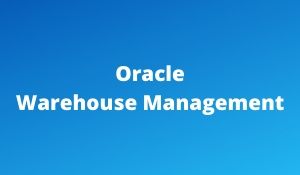
Oracle WMS is industry’s top inventory and warehouse management solution. It can support complex operations and increases the inventory and shipment accuracy. It delivers a total transparency from distribution warehouse to store shelf. Oracle WMS is a part of Oracle’s SCM and Manufacturing solution. It covers the areas of warehouse resource management, task management, advanced pick methodologies, warehouse configuration and many other value added services.
Oracle WMScontrols the material handling business processes from warehouses to distribution centers. Oracle Warehouse Management supports both paper-based and cloud-based environments with material handling systems and radio frequency (RF) based hand-held computers. To optimize the order fulfillment process, Oracle Warehouse Management provides different advanced distribution processes, such as value-added services, , order assembly postponement, resource and task management and cross docking. Oracle Warehouse Management also provides an easy-to-use dashboard for mobiles and computers. Bar-code scanning, automation processs, mobility widely improves the efficiency of the Supply Chain Logistics business processes.
Here you will learn :
Inbound logistics
Inventory Storage and facility Management
Oracle WMS Value added services
Outbound logistics
Reverse logistics
Warehouse configuration
Inbound Logistics:
Oracle WMS supports inter-organization shipments in each of three receipt routing methods:
- v Direct (receive and deliver)
- v Standard (receive and later deliver)
- v Inspection (receive, inspect, and later deliver)
Advanced shipment notices (ASNs) delivers a form of collaboration that increases the speeds of receiving process by giving access to the reciever to check the entire inbound loads, without entering individual line information. ASNs may contain information such as item number, item serial number, item lot number and purchase order number.
After the products are received, Oracle Warehouse Management can direct users to a determine staging location dynamically based on business rules and strategies that are predefined.
If there is a situation of shortage, the system will direct you to immediately cross dock the item, versus putting it away to a regular storage location.
The following table provides a summary of the inbound logistics tasks supported by Oracle Warehouse Management.
Inbound Logistics tasks include:
- Receiving with or without ASNs
- Receipt check-in
- Quality control inspection
- Bar code printing
- Directed put-away and storage optimization
- Opportunistic cross docking
Inventory Storage and facility Management
Oracle Warehouse Management gives you an advanced materials visibility and a a clear material movement for inventory control. Oracle Warehouse Management also provides license plate tracking of the complete warehouse. Also, the inventory tracking options provided by Oracle Inventory, Shipping, Receiving and Work in Process applications, Oracle Warehouse Management provides much more advanced features such as serial attribute tracking and visibility, material status control, and advanced space utilization capabilities.
Some of the tasks performed by Inventory, Storage, and Facility Management include:
- Container and license plate management
- Sub inventory configuration
- Advanced locator definition
- Kanban replenishment management
- Move orders (intra-organization transfers and issues)
- LPN based WIP completions
- Task dispatching
- Material status control
- Lot and serial genealogy and tracking
- Visibility of inventory ownership
- Cycle counting and physical inventory
- Date coding and shelf life monitoring
- ABC classification and analysis
Oracle WMS Value added services
All the manufacturing modes supported by the Oracle Agile Manufacturing suite of are also supported in Oracle Warehouse Management. This means that with Oracle Warehouse Management you can take advantage of mixed modes of manufacturing in assembly–from Project Manufacturing to kitting and dekitting.
Some of the Value added services include:
- Kitting and dekitting
- Customer compliance labeling
- Mixed-mode manufacturing
Outbound logistics

Oracle WMS automates the warehouse picking tasks. These tasks include the following:
- Assigning tasks to pickers, according to different business practices
- Allocating pick locations based on picking strategies that are configured using the Oracle Warehouse Management rules engine
- Packing and consolidation of materials into LPNs
- Vehicle loading and LPN Shipment confirmation
- Interfacing with compliance labeling systems to generate labels according to customer- or carrier-preferred formatfx
Reverse logistics
Oracle Warehouse Management enables the following reverse logistics tasks:
- Return Material Authorization (RMA) receiving
- Supplier returns (RTV)
- Refurbishment and recycling
Oracle Warehouse Management allows you to record and transact returns of material packed into a License Plate Number (LPN) using the feature called return to vendor. The user can also provide LPN based receiving corrections. LPN based returns can be initiated through the desktop forms or transacted through the mobile device interface by scanning the LPN to be returned. Corrections can be made directly through the desktop forms to immediately update information.
Warehouse configuration
Oracle Warehouse Management uses the same warehouse, resource, and other features as employed by the rest of the Oracle eBusiness Suite. These entities allows users to define inventory organizations, physical areas within the facility, and inventory locators, as well as material valuation cost groups–that are used to track inventory costs, departments within a facility, and the resources (both people and machines) that perform warehouse tasks, such as material movement and value added services.

